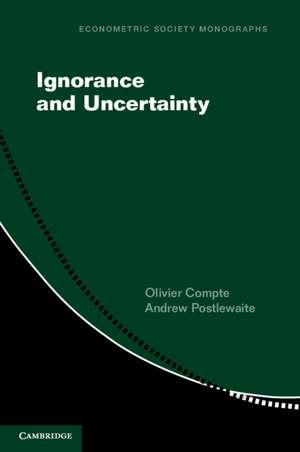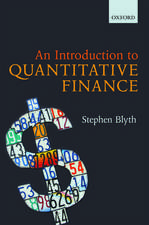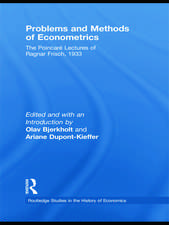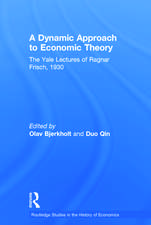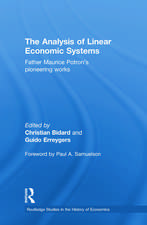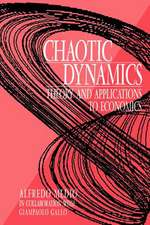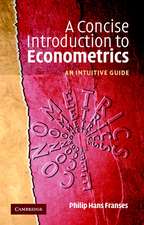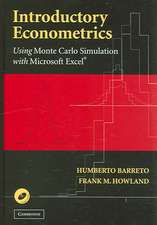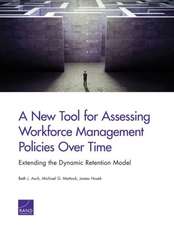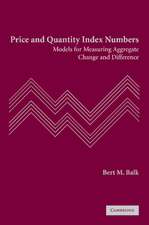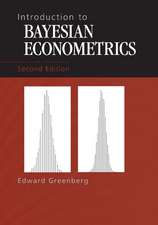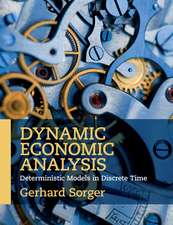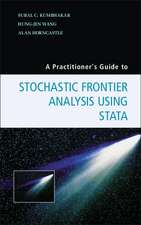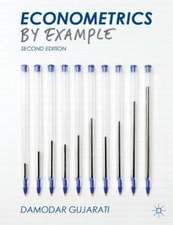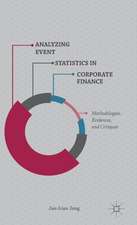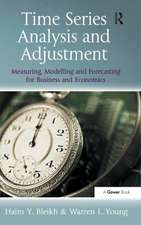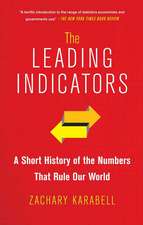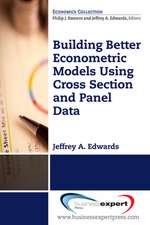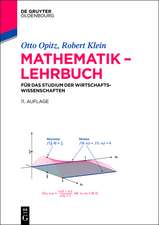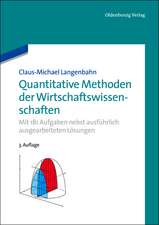Ignorance and Uncertainty: Econometric Society Monographs, cartea 61
Autor Olivier Compte, Andrew Postlewaiteen Limba Engleză Paperback – 12 dec 2018
| Toate formatele și edițiile | Preț | Express |
|---|---|---|
| Paperback (1) | 258.18 lei 43-57 zile | |
| Cambridge University Press – 12 dec 2018 | 258.18 lei 43-57 zile | |
| Hardback (1) | 698.61 lei 43-57 zile | |
| Cambridge University Press – 12 dec 2018 | 698.61 lei 43-57 zile |
Din seria Econometric Society Monographs
- 14%
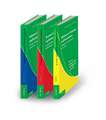 Preț: 2544.95 lei
Preț: 2544.95 lei -
 Preț: 256.66 lei
Preț: 256.66 lei -
 Preț: 441.20 lei
Preț: 441.20 lei -
 Preț: 308.05 lei
Preț: 308.05 lei -
 Preț: 366.95 lei
Preț: 366.95 lei -
 Preț: 258.04 lei
Preț: 258.04 lei -
 Preț: 287.28 lei
Preț: 287.28 lei -
 Preț: 326.53 lei
Preț: 326.53 lei -
 Preț: 371.03 lei
Preț: 371.03 lei -
 Preț: 400.76 lei
Preț: 400.76 lei -
 Preț: 348.09 lei
Preț: 348.09 lei - 11%
 Preț: 451.57 lei
Preț: 451.57 lei -
 Preț: 327.92 lei
Preț: 327.92 lei -
 Preț: 364.84 lei
Preț: 364.84 lei -
 Preț: 405.10 lei
Preț: 405.10 lei -
 Preț: 322.29 lei
Preț: 322.29 lei -
 Preț: 288.25 lei
Preț: 288.25 lei -
 Preț: 312.95 lei
Preț: 312.95 lei -
 Preț: 358.28 lei
Preț: 358.28 lei -
 Preț: 366.03 lei
Preț: 366.03 lei -
 Preț: 271.39 lei
Preț: 271.39 lei -
 Preț: 326.53 lei
Preț: 326.53 lei -
 Preț: 365.22 lei
Preț: 365.22 lei -
 Preț: 313.90 lei
Preț: 313.90 lei -
 Preț: 298.29 lei
Preț: 298.29 lei -
 Preț: 414.73 lei
Preț: 414.73 lei -
 Preț: 354.22 lei
Preț: 354.22 lei -
 Preț: 322.51 lei
Preț: 322.51 lei -
 Preț: 295.75 lei
Preț: 295.75 lei -
 Preț: 321.14 lei
Preț: 321.14 lei -
 Preț: 361.96 lei
Preț: 361.96 lei - 14%
 Preț: 719.44 lei
Preț: 719.44 lei
Preț: 258.18 lei
Nou
Puncte Express: 387
Preț estimativ în valută:
49.40€ • 51.72$ • 40.88£
49.40€ • 51.72$ • 40.88£
Carte tipărită la comandă
Livrare economică 07-21 aprilie
Preluare comenzi: 021 569.72.76
Specificații
ISBN-13: 9781108434492
ISBN-10: 1108434495
Pagini: 300
Ilustrații: 54 b/w illus.
Dimensiuni: 152 x 228 x 17 mm
Greutate: 0.41 kg
Editura: Cambridge University Press
Colecția Cambridge University Press
Seria Econometric Society Monographs
Locul publicării:New York, United States
ISBN-10: 1108434495
Pagini: 300
Ilustrații: 54 b/w illus.
Dimensiuni: 152 x 228 x 17 mm
Greutate: 0.41 kg
Editura: Cambridge University Press
Colecția Cambridge University Press
Seria Econometric Society Monographs
Locul publicării:New York, United States
Cuprins
Introduction; Part I. Modeling Challenges: 1. Action space; 2. Ignorance and uncertainty; 3. Observations, perceptions and strategies; 4. Strategies and strategy restrictions; 5. Knowledge and beliefs; Part II. Legends and Myths: 6. Information aggregation; 7. Mechanism design; 8. Surplus extraction; 9. Folk theorems; 10. Comparative statics; Part III. Applications: 11. Auctions; 12. Learning; 13. Reputation; 14. Cooperation; 15. Influence; 16. Information aggregation in markets; 17. Bargaining; 18. Attrition; 19. Reputation; 20. Coordination; 21. Ambiguity and other complexity related aversions; Miscellanea; Index.
Recenzii
'This book provides a refreshing and thought-provoking examination of the standard Bayesian foundations of economic analysis. Anyone who reads it will find themselves thinking differently about economic models and economics. The discipline of economics will be all the richer if the book is regularly read and discussed, by economists and others.' Larry Samuelson, A. Douglas Melamed Professor of Economics, Yale University, Connecticut
'We are in the midst of an era of confusion about what we are trying to accomplish in economic theory. In this book, two insightful economic theorists weigh in on the meaning of economic theory's basic concepts and models. Their comments, even when critical, are given in a spirit of devotion and love for economic theory.' Ariel Rubinstein, Tel Aviv University and New York University
'This is an important book, by two world-leaders in economic theory. It not only provides new insights into longstanding problems, but will also change the way we think about economic modeling and so change how we develop economic theory in the future.' Paul Klemperer, Edgeworth Professor of Economics, University of Oxford
'In this brilliant and path-breaking book, Compte and Postlewaite offer a new way of modeling agent reasoning in microeconomic theory, striking a balance between the demands of equilibrium analysis with 'perfect' rationality and the realities of human cognition. They do not focus on a particular anomaly while embracing the rest of the game-theoretical assumptions. Rather, they focus on plausible ways of reasoning for economic agents, allowing a distinction between the agents' and the modeler's world view. In doing so, Compte and Postlewaite provide a new language for modeling bounded rationality.' Itzhak Gilboa, Tel Aviv University and École des hautes études commerciales de Paris
'We are in the midst of an era of confusion about what we are trying to accomplish in economic theory. In this book, two insightful economic theorists weigh in on the meaning of economic theory's basic concepts and models. Their comments, even when critical, are given in a spirit of devotion and love for economic theory.' Ariel Rubinstein, Tel Aviv University and New York University
'This is an important book, by two world-leaders in economic theory. It not only provides new insights into longstanding problems, but will also change the way we think about economic modeling and so change how we develop economic theory in the future.' Paul Klemperer, Edgeworth Professor of Economics, University of Oxford
'In this brilliant and path-breaking book, Compte and Postlewaite offer a new way of modeling agent reasoning in microeconomic theory, striking a balance between the demands of equilibrium analysis with 'perfect' rationality and the realities of human cognition. They do not focus on a particular anomaly while embracing the rest of the game-theoretical assumptions. Rather, they focus on plausible ways of reasoning for economic agents, allowing a distinction between the agents' and the modeler's world view. In doing so, Compte and Postlewaite provide a new language for modeling bounded rationality.' Itzhak Gilboa, Tel Aviv University and École des hautes études commerciales de Paris
Notă biografică
Descriere
Proposes novel methods to incorporate ignorance and uncertainty into economic modeling without complex mathematics.
